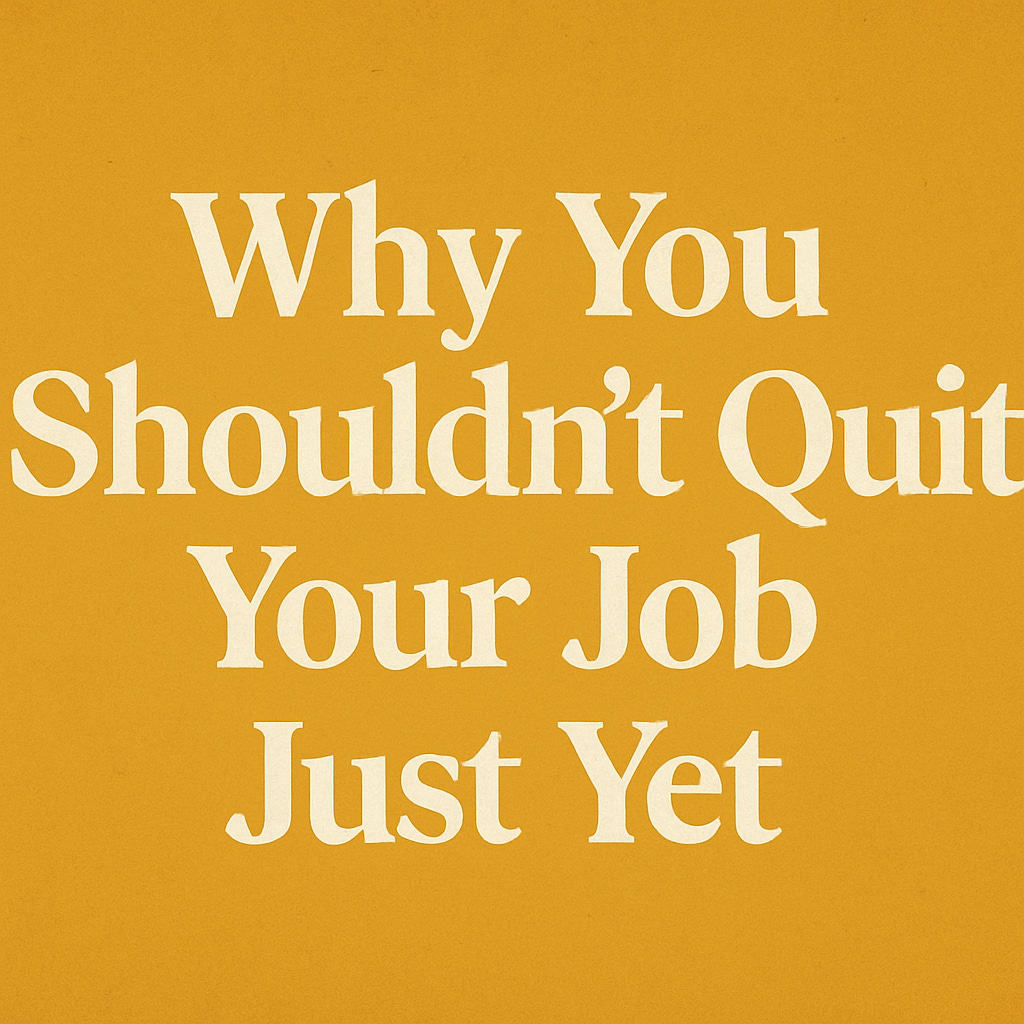Why You Shouldn’t Quit Your Job Just Yet
The Creative Alchemy – Edition #7
There’s a growing narrative online that quitting your job is the ultimate act of courage. That the day you hand in your resignation letter, you’re somehow stepping into your true life.
I understand the feeling. I’ve felt it too.
The longing for freedom. The curiosity to build something that’s your own. The fatigue of working on someone else’s dream while yours sits quietly in the background.
But here’s the thing no one tells you, quitting your job doesn’t automatically lead to clarity, creativity, or success. It just gives you more time with your own uncertainty.
1. Stability is underrated fuel for creativity
Most people think safety kills creativity. I think the opposite.
When your rent is covered, your bills are paid, and your meals aren’t dependent on your next client payment, you create better.
You think clearer. You take smarter risks.
A job can be your funding. A quiet sponsor for your future ideas.
The stability that everyone rushes to escape often becomes the very thing that allows you to build something meaningful on the side.
2. You don’t learn independence by escaping structure
A lot of people quit because they feel suffocated by their company or boss.
But the truth is, leaving structure doesn’t make you independent. It often makes you directionless.
Independence is a muscle built within structure, by learning to manage your energy, time, and ideas while still being accountable to something.
If you can’t find focus while employed, you’ll likely struggle even more without the external boundaries that come with a job.
Leaving isn’t liberation if you haven’t built self-discipline first. Please trust me on this - The days I decide to not follow a structure, I get nothing done, keep awake till 3 AM and feel extremely overwhelmed and tired.
3. The first 12 months after quitting are rarely glamorous
People often imagine their post-job life as creative mornings, slow coffee, and fulfilling work. What they don’t see is the anxiety of inconsistent income, the quiet panic of no structure, and the long hours spent wondering if you made a mistake.
You’ll question yourself constantly.
You’ll probably take on projects you don’t love just to pay the bills.
And you’ll realize that being your own boss sometimes means being a worse one than the manager you left behind. You are not neccessarily a better manager than the manager you hate on.
Freedom has a cost and too few people can bear it.
4. Learn to build before you leap
If you truly want to quit, start by building while you stay.
Start that side project. Test your ideas. Build your audience. Create your content.
Give yourself a year to understand the basics. How to pitch, how to sell, how to build systems, and how to stay consistent without being told to.
That year of doing both, your job and your dream, will teach you everything you’ll need when you finally take the leap.
Leaving is easy. Leaving ready is rare. Look at hundreds of examples of people who built something, whether a business, a content creation engine before they left their jobs.
5. Your job doesn’t define you, but it can refine you
Maybe your job isn’t the problem. Maybe it’s your relationship with it.
You don’t have to hate what sustains you. You can use your current role as a creative lab, to learn how to manage deadlines, collaborate, communicate, or lead.
Those same skills will become the foundation for whatever you build later. You don’t have to romanticize struggle to prove you’re brave. PLEASE
A gentler way to start
Instead of quitting, reframe how you see your job. It’s not the enemy. It’s the investor quietly funding your next chapter.
Use it wisely.
Build your base.
Then, when you finally leave, it won’t be out of frustration, but out of readiness.
Because the goal isn’t to escape work. The goal is to build a kind of work that feels like home. Otherwise anything we build will feel the same!


